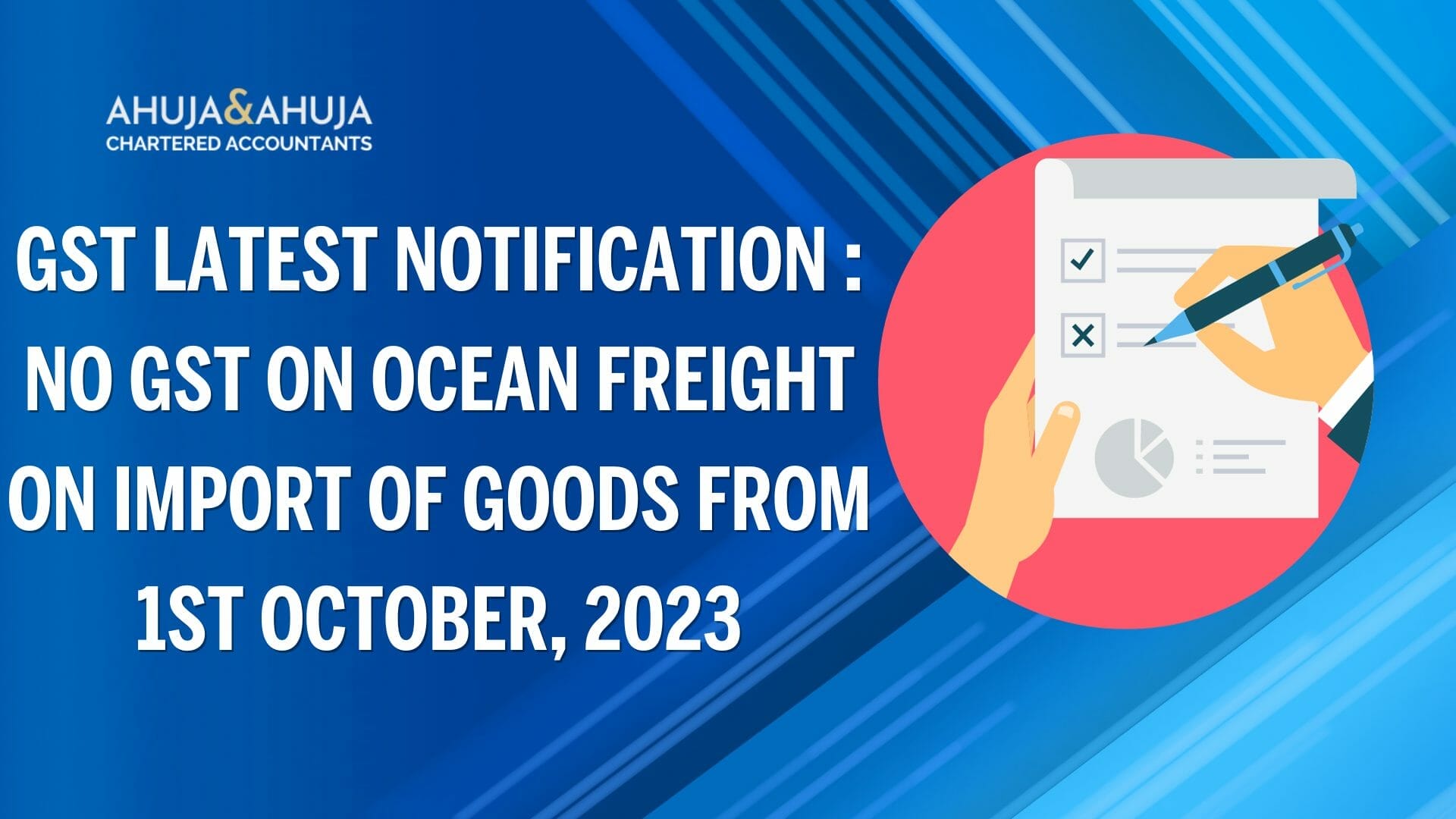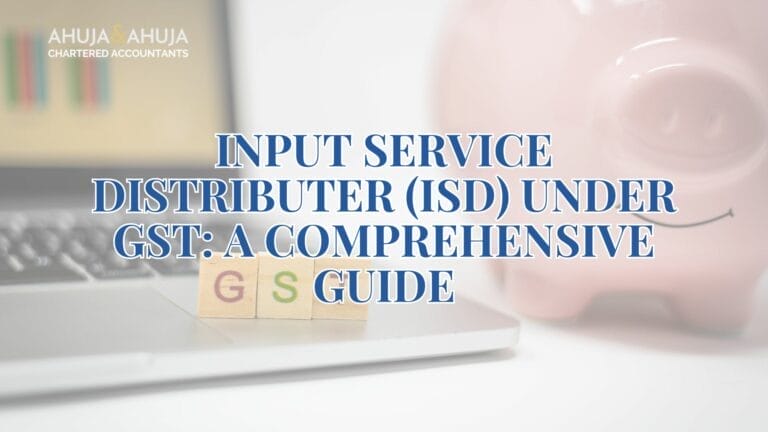GST Latest Notification: No GST on Ocean Freight on Import of Goods from 1st October, 2023
The business world is dynamic, with laws and regulations continually evolving. The latest move that is set to bring about significant change in the realm of international goods transportation pertains to the Integrated Goods and Services Tax (IGST). Effective from October 1, 2023, the Ministry of Finance has issued a notification exempting ocean freight from IGST. [^1^] But before we delve into the specifics of this new exemption, it’s crucial for businesses and stakeholders to grasp the fundamental principles that form the foundation of IGST.
IGST, part of the Goods Service Tax (GST) ensemble introduced in India in 2017, is a tax levied on the supply of goods and/or services in the case of inter-state trade. This revolutionary tax replaces numerous indirect taxes, thus simplifying the taxation system. Our GST registration services provide businesses with comprehensive assistance in understanding and navigating through the GST regime.
Historically, ocean freight services were subject to IGST, impacting all those involved in importing goods via the sea. But how did this scenario come about? To answer that, one must travel back to the inception of GST and its subsequent amendments. IGST, being an integral part of GST, has reflected the broader changes to the tax structure over time.
In the past, ocean freight services were among the multitude of processes subject to taxation under IGST. The principle was straightforward: if you’re facilitating trade by transporting goods across state borders, you’re conducting an activity that is taxable under IGST. However, the recently issued notification will bring a transformation in this segment, with implications for ocean freight services and importers alike.
Overview of the Notification
The recent notification issued by the Ministry of Finance brings a significant change to the taxation of ocean freight under the purview of IGST. To gain a clear understanding of this amendment, let’s break down the language used in the notification into simpler terms.
The notification, issued under the authority conferred by the Integrated Goods and Services Tax Act, 2017, empowers the Central Government to make amendments to the existing notification, No. 8/2017-Integrated Tax (Rate), dated June 28, 2017. This amendment will come into effect from October 1, 2023.
In simple terms, the notification states that there will be no levy of IGST on ocean freight services provided for the transportation of goods by a vessel from a place outside India up to the customs station of clearance in India. In other words, the tax previously applicable to such services is now exempted. This move aims to facilitate trade, reduce financial burdens on importers, and streamline the process of importing goods via ocean freight.
The exemption of IGST on ocean freight signifies a shift in the approach towards taxing transportation services. This change acknowledges the importance of smooth logistic operations in international trade and promotes ease of doing business. Businesses engaged in importing goods will be relieved from the burden of additional tax liabilities associated with ocean freight charges.
Impact Analysis: Pros and Cons
The exemption of ocean freight from IGST brings forth several implications, both positive and negative. Let’s explore the potential impacts of this significant change:
Pros
- Cost savings for importers: By removing the burden of IGST on ocean freight, importers will benefit from reduced expenses in their overall import costs. This can potentially lead to increased competitiveness in international trade.
- Streamlined logistics and inventory management: The exemption of IGST on ocean freight eliminates the need for complex tax calculations and documentation related to such services. This simplification can result in smoother logistic operations, reducing paperwork and administrative burdens for businesses.
Cons
- Impact on government revenue: With the exemption of IGST on ocean freight, the government’s revenue from this source will be affected. It’s essential for policymakers to consider alternative avenues to compensate for any potential loss in revenue.
- Potential implications for businesses and consumers: While the exemption benefits importers, it’s crucial to assess the broader implications on businesses and consumers. Changes in taxation policies can have ripple effects on pricing, supply chains, and the overall cost of goods. It’s important for businesses and consumers to stay informed and adapt to any such changes.
While the exemption of IGST on ocean freight brings several advantages for businesses engaged in importing goods, a comprehensive analysis of the pros and cons is necessary to gauge its overall impact on the economy. As businesses and stakeholders adapt to this change, it will be interesting to observe how the new dynamics of international trade unfold.
Comparative Case Study: Before and After the Exemption
To provide a clearer understanding of the impact of the exemption of ocean freight from IGST, let’s examine a hypothetical comparative case study of importing goods before and after October 1, 2023:
Before the Exemption:
- An importer purchases goods from a supplier located outside India.
- The goods are transported via ocean freight to a customs station in India.
- Along with the cost of goods, the importer incurs IGST on the ocean freight charges, as per the previous tax regime.
- The importer is required to calculate, pay, and document the IGST on the ocean freight as per the applicable rates.
After the Exemption:
- Under the new tax regime, the importer purchasing goods from a supplier located outside India continues to do so.
- The goods are still transported via ocean freight to a customs station in India.
- However, the importer is now exempted from paying IGST on the ocean freight charges.
- The paperwork and calculations related to IGST on ocean freight are no longer required, simplifying the process for the importer.
By comparing these two scenarios, it becomes evident that the exemption of IGST on ocean freight can result in reduced costs and administrative burdens for importers, contributing to a more seamless importing process.
Frequently Asked Questions (FAQs)
Does the exemption of ocean freight from IGST apply to all imported goods?
Yes, the exemption applies to all goods imported via ocean freight, provided they meet the specified conditions outlined in the notification.
What are the implications for businesses involved in ocean freight services?
Ocean freight service providers will no longer be required to levy and collect IGST on the transportation charges for goods imported via sea. This change simplifies their tax obligations and may require adjustments to their invoicing and billing processes.
Will the exemption of IGST on ocean freight impact other taxes and charges related to imports?
The exemption specifically pertains to IGST on ocean freight charges. Other applicable taxes, such as customs duty, will continue to be applicable as per existing regulations.
Can businesses claim a refund for IGST paid on ocean freight charges prior to October 1, 2023?
Refunds for IGST paid on ocean freight charges before the exemption came into effect should follow the provisions outlined in the GST refund process. Our GST refund services can assist businesses in navigating the refund process.
Will the exemption of IGST on ocean freight impact the pricing of imported goods?
The exemption may have an indirect impact on the pricing of imported goods. Importers may experience reduced costs due to the removal of IGST on ocean freight charges, which can potentially lead to more competitive pricing.
Conclusion
The recent notification exempting ocean freight from IGST marks a significant development in the realm of international goods transportation. With this exemption set to take effect from October 1, 2023, businesses engaged in importing goods via ocean freight can expect several positive changes.
The removal of IGST on ocean freight charges brings cost savings for importers, streamlines logistics and inventory management processes, and reduces administrative burdens. This exemption acknowledges the importance of seamless trade facilitation and promotes ease of doing business.
However, as with any change in taxation policies, there are also considerations to keep in mind. The government revenue associated with IGST on ocean freight will be affected, necessitating alternative measures to compensate for potential revenue loss. Additionally, changes in taxation policies may have implications for businesses and consumers, including potential impacts on pricing and supply chains.
In light of these developments, it is essential for businesses and stakeholders to stay informed and adapt to the evolving tax landscape. Seeking guidance from tax professionals and legal experts can help businesses navigate the implications of the exemption and ensure compliance with applicable regulations.
As the exemption of IGST on ocean freight comes into effect, it will be intriguing to observe how it shapes international trade dynamics and contributes to the growth of the economy.
Disclaimer
The materials provided herein are solely for educational and informational purposes. No attorney/professional-client relationship is created when you access or use the site or the materials. The information presented on this site does not constitute legal or professional advice and should not be relied upon for such purposes or used as a substitute for professional or legal advice.







